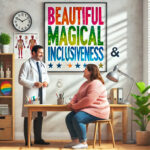No eating disorder is an island
No eating disorder is an island
Children who develop an eating disorder deserve the opportunity to receive evidence-based treatment – that is, a treatment that has been thoroughly tested and has both runs and explanation on the board.
Alas, for most people, this is not a reality in 2012. It is a dream.
Recovering from an eating disorder, for many children and their families, remains a foggy, nightmarish, journey.
No clear treatment path. What could be a short, straight path to recovery becomes horribly confusing, something like scariest moments on the Yellow Brick Road in The Wizard of Oz.
I am impatient on behalf of children and adolescents who are vulnerable right now, who are showing signs and symptoms of developing an eating disorder today.
I am impatient because researchers have produced evidence that early intervention with Family-Based Treatment (also known as the Maudsley approach) provides the best chance of recovery for children and adolescents.
Yet the path has not been easy for this ‘new kid on the ED treatment block’.
FBT has been around more than 20 years, evolving as it did at London’s Maudsley Hospital, but is still considered an outsider by many practitioners in the eating disorder field.
I don’t understand why. To me it’s simple: this treatment works for most people, so why hold back? Why not train more therapists in FBT, and send them forth to help families with early intervention?
Why are we allowing children to suffer unnecessarily; why are we not speeding up early diagnosis and intervention, giving the best chance of halting the eating disorder in its tracks, and allowing the child to resume their life – in a matter of weeks or months, rather than years or decades?
Why?
Listening to arguments going back and forth among the professionals, there seems no easy answer and, to keep feeling positive, there is nothing else for me to do but beat my drum, loudly and without reservation.
‘ED’ robbed me of a normal childhood and adolescence, stole my relationship with my parents and sister, and stole my marriage. ‘ED’ almost stole my life.
Untreated for more than two decades, the insidious illness became entrenched in my brain, leading to an inability to settle, leading to constant chaos and self-doubt, leading to tormenting thoughts and behaviours that people thought were the real me. The cost to my mental and physical health, and relationships, cannot be measured.
But I am lucky. I met some marvellous health professionals who believed in me and, together with the love of my children and grandchildren, they instilled a will to live, and the strength to survive. I did not have the benefit of FBT but I did have the benefit of people who convinced me that I could overcome this illness.
Not everyone is as fortunate. On behalf of the families who have lost a member of their family to an eating disorder, I beat my drum doubly loudly.
First base
I want FBT to be offered to every family as a matter of course when their child is considered to be at risk of developing an eating disorder, in this case, Anorexia Nervosa. The steps required seem simple enough.
We need to:
- Educate GPs to recognise the signs and symptoms.
- Give the GPs instructions on where to immediately refer the family for FBT.
- Ensure we have sufficient therapists trained in FBT, and trained properly.
- Ensure the therapists are not only trained, but also passionate in their vocation – it is their passion and knowledge that will convince the parents that this treatment can save their child.
- Provide more support for families – taking care of a child 24/7, particularly a child incapable of understanding they are ill, is supremely difficult. Trusted caregivers are needed to help provide the 24/7 care and give parents respite.
- Provide ongoing care, as long as it takes, for the child’s body and mind to heal from the eating disorder.
Not for everyone
FBT is not for everyone and research is underway to improve its delivery – to find out what the issues are for families who say ‘this is not for us!’
Is too much expected of families? Parents are parents. Does this make them automatically suitable for the role of full-time caregiver? What if they need to work, need to look after other children in the family, have elderly parents who need taking care of? Have their own mental and physical health issues to contend with? The list goes on.
Trust is vital
Another issue being noted is that of the relationship between the therapist and the patient. If the therapist does not believe in the therapy they are offering to the patient, it won’t work!
The patient will sense the therapist’s doubt and failure will be assured. Besides believing in the treatment, the therapist must also believe in the patient’s ability to recover. The patient will sense this, also. Trust is vital.
Parents who are doing FBT with their child also need to feel and believe that the therapist totally believes this therapy WILL work. Parents need to be instilled with confidence that they can trust the therapist and themselves in saving their child. It’s a huge undertaking.
You can have a good, evidence-based treatment in theory, but if the therapist does not believe in it 100 per cent, it won’t work. ‘ED’ is smart and therapists need to be smarter. Allow one iota of doubt to appear – a facial expression can be enough to sow the seed of doubt – and ‘ED’ will grab it and magnify the doubt a million times over.
I know. I’ve been there. I am forever grateful to a handful of therapists who patiently, over MANY years, worked on persuading me to trust them – trust them with my life – trust them to gradually, very gradually and painstakingly, thread by thread, let go of ED and rebuild my sense of identity.
As one with 50 years of ED experience, I feel both heartened and disheartened, observing ‘movement at the station’ in the eating disorder field. Some people have a clear idea of where the field needs to be heading, others are rather bogged down in outmoded and unsubstantiated belief systems. How good it would be for the field to agree on some foundation principles so that, at first base at least, families could know what to expect.
My message to clinicians: consider your passion, reflect on what you truly believe in, question why, be open to new science, be open to new treatments that have evidence-base, be open to self-growth – for you are in the business of saving lives – not only lives of people with an eating disorder, but of their families. Eating disorders are not islands. They affect every member of a family. Not only the person with the illness. As one who lost much held dear to the ravages of ‘ED’, I urge you to remember this.
Every one of us needs family.
Families, like doctors, need to be educated about, and made aware of, evidence-based treatments for eating disorders; and they need to know support systems are in place as they put aside everything else to undertake the difficult but necessary work of working as a family toward full recovery. At the end of the day, we are all in this together; working together; let’s settle for nothing less.






